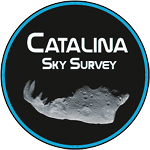Beginning in 2016 CSS was funded to create a publicly accessible archive of asteroid survey data products acquired since the 2003/2004 observing season. This amounts to ~40 telescope years of data from the observatories in Arizona and Australia, about 3,000,000 images total plus many millions of related files of catalog and astrometric information. Catalina has partnered with the Small Bodies Node of the Planetary Data System (PDS), hosted at the Planetary Science Institute (PSI) in Tucson, to work toward this goal. We anticipate the initial project will take about three to four years.
The initial work has focused on safeguarding Catalina's precious data by completing an inventory of CSS data and replicating the archive holdings onto new duplicate mass storage systems hosted at two locations on the University of Arizona campus: 1) CSS headquarters at the Lunar and Planetary Laboratory, and 2) co-located at the high bandwidth and highly redundant 24/7 University Information Technology Services (UITS) data center. In the initial year of the project storage and servers were acquired, configured, and installed at both locations, with all CSS servers at LPL being moved into a new climate and power controlled computer room. All CSS archival data were replicated onto both sites, and at the same time the CSS hard media (DVDs and Blu-ray disks) were moved into climate controlled quarters for deep storage.

Catalina Sky Survey data archive facilities, including a) and b): LPL-based storage and servers and c): DVD and Blu-ray hard media all located within a dedicated power- and climate-controlled room; and d) redundant CSS mass storage located within the University Information Technology Services (UITS) data center.
CSS and PSI are iterating on plans to begin ingesting nightly data sets into the PDS toward the end of 2017. This requires describing the complex CSS data products and metadata in terms understandable to PDS. Catalina will also take this opportunity to reprocess legacy data sets through the current CSS pipeline workflow, and batch reprocessing of the millions of files will commence after nightly archiving is fully commissioned. We anticipate that this will also produce numerous prediscovery observations of catalog objects that have since become known, which will be submitted to the Minor Planet Center to extend orbital arcs.



